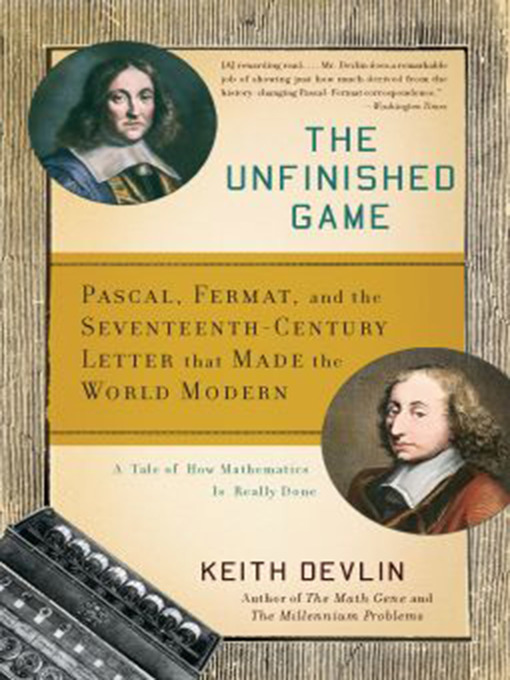Before the mid-seventeenth century, scholars generally agreed that it was impossible to predict something by calculating mathematical outcomes. One simply could not put a numerical value on the likelihood that a particular event would occur. Even the outcome of something as simple as a dice roll or the likelihood of showers instead of sunshine was thought to lie in the realm of pure, unknowable chance. The issue remained intractable until Blaise Pascal wrote to Pierre de Fermat in 1654, outlining a solution to the "unfinished game" problem: how do you divide the pot when players are forced to end a game of dice before someone has won? The idea turned out to be far more seminal than Pascal realized. From it, the two men developed the method known today as probability theory. In The Unfinished Game, mathematician and NPR commentator Keith Devlin tells the story of this correspondence and its remarkable impact on the modern world: from insurance rates, to housing and job markets, to the safety of cars and planes, calculating probabilities allowed people, for the first time, to think rationally about how future events might unfold.
- Sibling Stories
- The Big Apple
- May the Fourth Be With You
- How Does Your Garden Grow?
- Curl Up with a Cozy Read
- Judge These Books By Their Covers
- Cozy Animal Mysteries
- Coming to America
- Local Authors and Illustrators
- Mother Continent
- Tour of America
- Monster Mash
- Bans Off Our Books
- See all ebooks collections
- Sibling Stories
- The Big Apple
- May the Fourth Be With You
- How Does Your Garden Grow?
- Curl Up with a Cozy Read
- Judge These Books By Their Covers
- Cozy Animal Mysteries
- Coming to America
- Local Authors and Illustrators
- Mother Continent
- Tour of America
- Monster Mash
- Bans Off Our Books
- See all audiobooks collections
- Home & Garden
- Cooking & Food
- Fashion
- News & Politics
- Sports
- Celebrity
- Business & Finance
- Kids & Teens
- Science
- See all magazines collections

